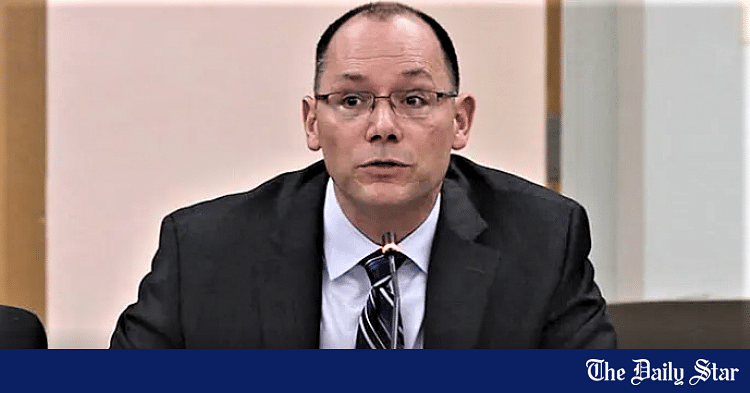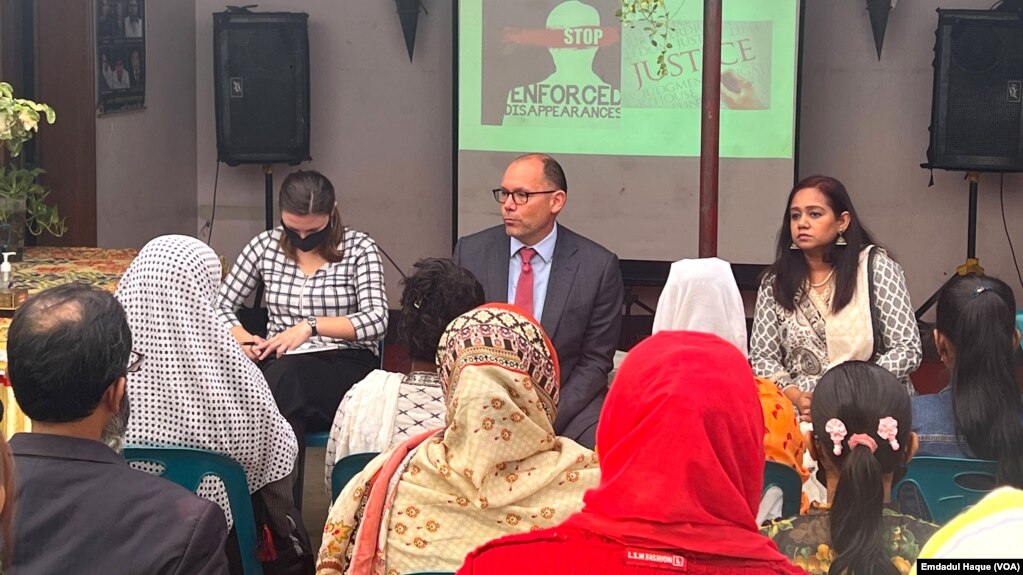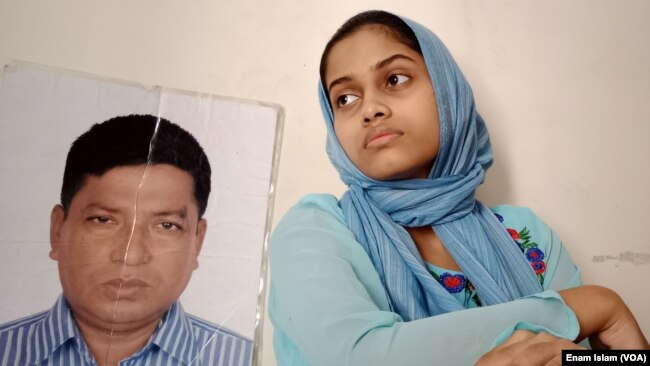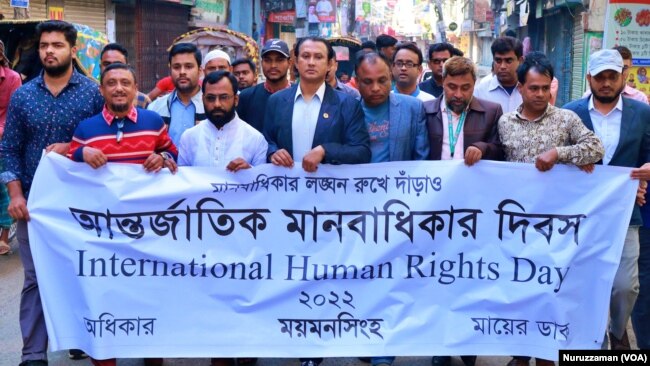Protesters Drive US Envoy from Meeting with Families of Missing Bangladeshis
December 20, 2022 11:47 PM
Peter D. Haas, the US envoy in Bangladesh, at a meeting with some families of alleged victims of enforced disappearance, in Dhaka, Bangladesh, Dec. 14, 2022.
The U.S. ambassador to Bangladesh cut short a meeting with some families of alleged victims of enforced disappearance last week because of pro-government protesters who tried to force their way into the meeting venue and surrounded his car, the embassy said.
The incident occurred December 14 at a private residence in Dhaka, home to a co-founder of an organization called Maayer Daak, Bengali for Mothers Call. Ambassador Peter E. Haas was meeting there with several families who say their loved ones were abducted by government forces and have not been heard from since.
Anisha Islam Insha with the photo of her father Ismail Hossain Baten, an enforced disappearance victim. Mr Baten remains has not been seen since members of a government security agency picked him up from Dhaka in 2019. "We are anxiously waiting for the safe return of my father," the daughter said.
“Families of over a dozen victims of enforced disappearance assembled at our place to share their experiences with the ambassador,” said meeting host Sanjida Islam Tulee, a coordinator at Maayer Daak. “But after the crowd of local Awami League supporters began swelling outside our house, for security reasons, he had to leave the meeting midway.”
The U.S. embassy in Dhaka confirmed in a statement to VOA that the ambassador ended his meeting early “due to security concerns.”
“The meeting was interrupted by protesters who attempted to enter the building where the ambassador was located. Other protesters surrounded the ambassador’s vehicle,” embassy spokesperson Jeff Ridenour said. “We have raised this matter at the highest levels of the Bangladeshi government, as well as with the Bangladesh embassy in Washington, D.C.”
Enforced disappearances are a long-standing issue in Bangladesh, especially under the current Awami League administration of Prime Minister Sheikh Hasina. In a report last year, Human Rights Watch identified 86 victims who, it said, “were forcibly disappeared and who remain missing.”
Bangladeshi human rights groups Odhikar and Maayer Daak activists and volunteers demonstrating against enforced disappearances in the country on the International Human Rights Day, in Mymensingh, Bangladesh, Dec. 10, 2022.
“Awami League leadership and Bangladesh authorities mock victims and routinely obstruct investigations, making clear that the government has no intention of meaningfully addressing enforced disappearances by its security forces,” said Brad Adams, Asia director at HRW,
in releasing the report.
During her visit to Bangladesh in August, the U.N. high commissioner for human rights, Michelle Bachelet, urged the Bangladesh government to ratify the International Convention for the Protection of all Persons from Enforced Disappearance.
“Bangladesh is party to all the core U.N. human rights treaties, except for it,” she said, adding that there are “continued, alarming allegations of both short-term and long-term enforced disappearances, and concerns about the lack of due process and judicial safeguards.
The government of Bangladesh insists there have been no cases of enforced disappearance during the Awami League-led regime.
Local newspapers said the crowd that disrupted the ambassador’s meeting included members of Mayer Kanna, a rival organization comprising of families of army personnel who, they say, were victims of enforced disappearance in 1977 during a previous administration.
The country at that time was headed by President Ziaur Rahman, founder of the Bangladesh Nationalist Party, which is now the largest opposition party. The reports say the Mayer Kanna members hoped to present Haas with a memorandum calling the attention of U.S. authorities to the 1977 disappearances.
According to witnesses, the ambassador left the Tulee home hurriedly without interacting with the Mayer Kanna protesters. Ridenour said the group had not followed protocol by requesting a meeting, and that the embassy “had not received any prior communication from Mayer Kanna over the last several years.”
The foreign minister of Bangladesh AK Abdul Momen said Monday (Dec 19) that Mayer Kanna group went against the norm by trying to submit a memorandum to the U.S. ambassador the way they did.
"Our country does not have the culture to stop a foreign ambassador on the road to submit a memorandum. Why did Mayer Kanna not communicate with the embassy first letting them know that they wanted to submit a memorandum to the ambassador? We will ask the group why they did so," the minister said.
Members of the Maayer Daak group said they were pleased with Wednesday’s meeting.
“The ambassador sought to know about the enforced disappearance cases. We described before him how our brothers, sons and fathers became victims of enforced disappearance, and we are waiting for their safe return anxiously. We also explained how the cases have not been properly investigated by the authorities in Bangladesh despite repeated appeals from us. He listened to us attentively,” Tulee told VOA.
“In the past years, the U.S. embassy regularly maintained interactions with our organization on the issue of the enforced disappearances,” she said. “Finally, the ambassador himself came down to our place to meet the families of the victims. We understand that the U.S. is concerned about the serious human rights violations, including the issue of enforced disappearance in Bangladesh.”
Ridenour said human rights are “at the center” of U.S. foreign policy. “Therefore, the U.S. embassy takes seriously all allegations of human rights violations and regularly meets with a wide variety of human rights organizations.”
Nasrin Zahan Smrity, whose husband has not been seen since he was taken from his home in 2019, said she has met with authorities several times to discuss his case but is not satisfied with the actions that have been taken.
“As the ambassador came to meet us, we believe that the U.S. has taken the issue of enforced disappearance in Bangladesh very seriously,” she said. “We are thankful to the U.S.”
-----------------------------------------------------------------------------------------------------------------------------------------------------------------
It is really disheartening to me that some people here are advocating rebelling against the US (who essentially feeds our economy for the most part) while others at the same time are advocating Bangladeshis to being subservient to Indian RSS Hindutva whims and interests.
If US cuts off the Bangladesh meal ticket, I will see what Bangladeshi goes to Indian Hindutvas and asks for alms from them. Hasina and fifth columnist Chetona a-holes will be found nowhere then.
Good Luck.....










